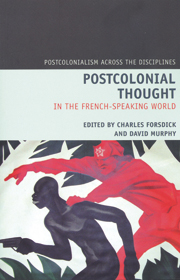Book contents
- Frontmatter
- Contents
- Acknowledgements
- Introduction: Situating Francophone Postcolonial Thought
- Section 1 Twelve Key Thinkers
- Section 2 Themes, Approaches, Theories
- 13 Postcolonial Anthropology in the French-speaking World
- 14 French Theory and the Exotic
- 15 The End of the Ancien Régime French Empire
- 16 The End of the Republican Empire (1918–62)
- 17 Postcolonialism and Deconstruction: The Francophone Connection
- 18 Negritude, Présence Africaine, Race
- 19 Francophone Island Cultures: Comparing Discourses of Identity in ‘Is-land’ Literatures
- 20 Locating Quebec on the Postcolonial Map
- 21 Diversity and Difference in Postcolonial France
- 22 Colonialism, Postcolonialism and the Cultures of Commemoration
- 23 Gender and Empire in the World of Film
- 24 From Colonial to Postcolonial: Reflections on the Colonial Debate in France
- Notes on Contributors
- Bibliography
- Index
18 - Negritude, Présence Africaine, Race
from Section 2 - Themes, Approaches, Theories
- Frontmatter
- Contents
- Acknowledgements
- Introduction: Situating Francophone Postcolonial Thought
- Section 1 Twelve Key Thinkers
- Section 2 Themes, Approaches, Theories
- 13 Postcolonial Anthropology in the French-speaking World
- 14 French Theory and the Exotic
- 15 The End of the Ancien Régime French Empire
- 16 The End of the Republican Empire (1918–62)
- 17 Postcolonialism and Deconstruction: The Francophone Connection
- 18 Negritude, Présence Africaine, Race
- 19 Francophone Island Cultures: Comparing Discourses of Identity in ‘Is-land’ Literatures
- 20 Locating Quebec on the Postcolonial Map
- 21 Diversity and Difference in Postcolonial France
- 22 Colonialism, Postcolonialism and the Cultures of Commemoration
- 23 Gender and Empire in the World of Film
- 24 From Colonial to Postcolonial: Reflections on the Colonial Debate in France
- Notes on Contributors
- Bibliography
- Index
Summary
When Wole Soyinka famously pronounced at a conference in Berlin in 1964 that ‘a tiger does not proclaim his tigritude, he pounces’ (quoted in Jahn, 1968: 266), he was suggesting that Negritude, the literary and cultural movement initiated in the 1930s by young writers from the French colonies in Africa (Léopold Senghor of Senegal), the Caribbean (Aimé Césaire of Martinique), and South America (Léon Damas of Guyana) who were studying in Paris, was unnecessary, even redundant. (See Chapters 1 and 12 on Césaire and Senghor respectively.) In Soyinka's view, Negritude, with all its talk of racial identity and pride, was long on discourse and short on action. Soyinka took the position that dialogue with white, colonizing Europe was, in effect, pointless and that black Africa had to forge a separate path (1976: 126–39). Inasmuch as Negritude can be considered a coherent movement with a clear set of principles, its position was indeed different from Soyinka's on this point, and avowedly so. Negritude was always explicitly dialogical, locked as it was at its origins in a forced embrace with a continent and a country that had theretofore determined the terms of the relationship between black and white, master and slave, colonizer and colonized, dominator and subaltern. That the Negritude movement first began to take form in French educational institutions in the mid-1930s, and that the publishing house Présence Africaine was established and still has its headquarters in the heart of the Latin Quarter in Paris, are ample proof of this will to dialogue and of the conditions that necessitated it.
- Type
- Chapter
- Information
- Postcolonial Thought in the French Speaking World , pp. 227 - 237Publisher: Liverpool University PressPrint publication year: 2009

